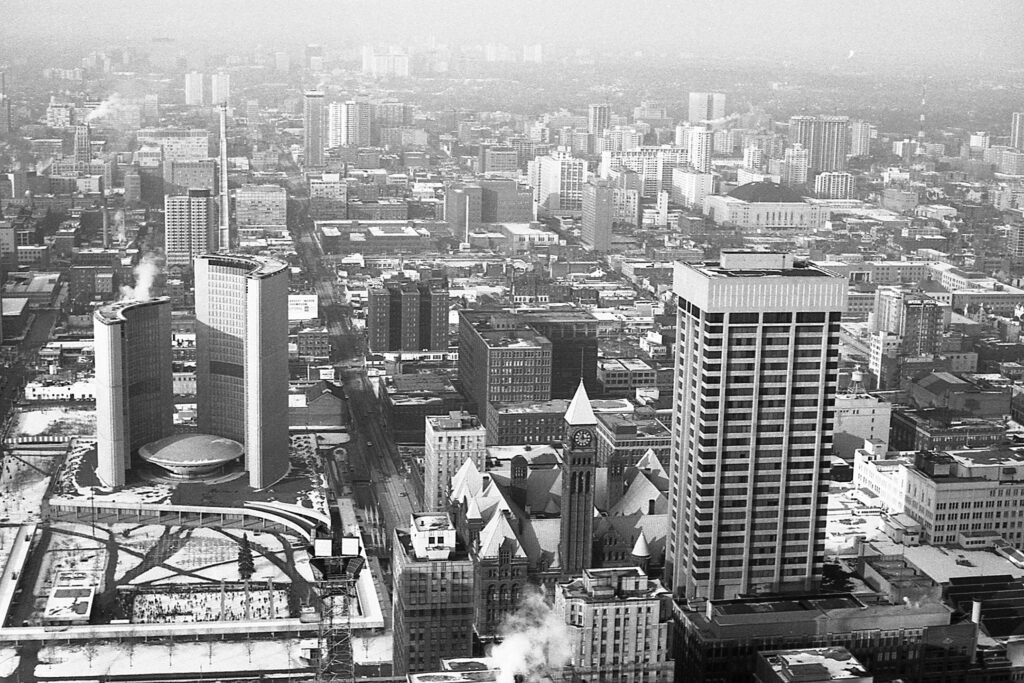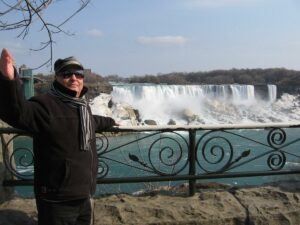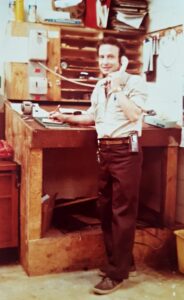Josef Löbl
I was born into a Jewish family in the middle of World War II in Almaty, Kazakhstan. My father Vítězslav Löbl, a native of Ostrava, had a German education as a child of Austria-Hungary. He trained as a tailor and went to Radom, Poland, to gain some experience. He was accommodated in the family of a Jewish butcher, Baruch Zylberberger, who had four daughters and two sons. And coincidentally, one of those daughters, Dora, father fell in love with. The war began and he and his new wife wondered where they would be safe as Jews. They chose to leave for Russia. In Almaty, my father repaired the uniforms of Russian soldiers, my mother probably helped him, took care of the household, and she gave birth to me in the spring of 1943. After the war, my parents returned with me through Poland. According to the story, we sailed on the Volga River and I, as a small three-year-old child, met Stalin in person. But neither in Radom nor in Krakow did the parents find any of my mother’s relatives. They concluded that the whole family had died during the war in a concentration camp. In the meantime, my brother Jindřich was born in Szczecin in 1946. My parents continued to Ostrava, where my father was seeking his relatives. Someone told him some Mr. Löbl was living in Krnov. We went there and actually found my father´s brother’s plumbing company. There were vacant houses in the border town of Krnov after the expulsion of the Germans. The authorities welcomed anyone who wanted to settle the area. The city gave us an apartment on the first floor of a small villa. In this house, I spent my early childhood, went to school and to the cinema, where I understood, as the only Russian speaker, Soviet movies in the original, and I also had fun with my friends. Compulsory school attendance ended in the eighth grade, then I moved to Otrokovice to study to become an electrician. I commuted home each week by a train pulled by the old steam locomotives, releasing soot into the open windows of the wagons. In Krnov, I didn’t even know about my Jewish origin. My parents, typically for their generation, did not talk about it, though Dad wore a headdress for festive lunches and dinners. There were several large companies in Krnov, one of them, Karnola, where fabrics were woven, became my workplace after vocational training. I started to work there as an electrician. After the war, I graduated from evening electrical engineering in Bruntál. A friend who stayed in Prague encouraged me to go to the capital, where there were more job opportunities for a person with a high school diploma. My journey through life led me from Moravia to Bohemia. I got a place and an apartment from a Prague building construction company.
It turned out that only one sister died in the concentration camp

Around that time, a woman went to Canada for a wedding. There, to her surprise, she met a woman she had met in Poland immediately after the war and from whom she had learned that she was going to Czechoslovakia to look for her husband’s family. She was talking about my mother! The wedding guests were very interested, because this wedding guest was my mother’s older sister Henia, who looked pretty much like her. It turned out that only one sister died in the concentration camp, the other three and both brothers survived and were living in Canada. The whole Canadian family approached the Red Cross to find my mother in Czechoslovakia. After months of work, they succeeded. Immediately afterwards, two of my mother’s sisters, my aunts, came to Czechoslovakia and the reunion was wonderful. They offered our family the invitation to relocate to Canada, but my parents refused. They already had a well-established life and friends in Krnov. However, my brother and I wanted to try life overseas. The aunts sent plane tickets and official invitations. In the meantime, my brother fell in love and got married, so I flew to Montreal alone; the year was the year 1976. I got boarded with the Czechoslovak Olympic team on a tourist visa and no one, except my parents and brother, knew that I didn´t intend to use the return ticket.
I prepared for the trip to Canada in advance, I took evening English classes, but I didn’t gain much language skills there. For example, when I went to the bathroom at Frankfurt International Airport and paid with a five-dollar bill, I didn´t know how to ask for change. I landed in Montreal and waited four hours for my cousin from Ottawa who had to pick me up and got stuck somewhere along the way. The airport staff did not want to believe that a young man from a Communist country had arrived as a tourist. Since I didn’t know much English then, my cousin had to explain everything to them. I spent the first six months in Ottawa with my oldest aunt Mani, who employed me in her antique shop. I had my own room and a relatively easy life. After six months, I went to Toronto to see my second aunt Henia. She signed me up to a six-month intensive eight-hour English course for immigrants, paid for by the state. I liked it so much that I bought another month of classes. I also found my first friends, Koreans and Frenchmen from Quebec, among the classmates. I avoided meeting other Czechs, to improve my English. In Toronto, I obtained an electrician’s license and got a job at CN, which is still a large railway company. There is a strong Jewish community in Canada. Thanks to Aunt Henia, I became part of it and also met my wife, a Czech Jew from Ostrava. My CN employer wanted to keep me working for them and offered me a college degree. I got a part-time job and enough time to study, with the only condition. I had to commit to stay working for CN for another fifteen years. I had an interesting job until my retirement. Based on the records from the black boxes of the locomotives, I diagnosed faults and corrected them with my team.
The airport staff did not want to believe that a young man from a Communist country had arrived as a tourist
I also started playing tennis in Canada, which I fell in love with. It is close to my heart even today. My friend Miloš and I enjoyed going to his cottage on Lake Simcoe, and with my family friend, Ivan, I tried portaging (canoeing on lakes and carrying the canoe overland through forests). I had an easier start in Canada thanks to the support of my mother’s family. I didn’t have to emigrate and spend time in a refugee camps. I got to Czechoslovakia for the first time after a few years on a Canadian passport. My parents visited me several times in Toronto, met my wife and had fun with my two daughters. Both daughters are teachers now and still live with their families in Canada. After the death of my wife, I returned to Prague.






Patricia MIlitzer
So interesting to read different life stories from Czech people who left their country of origin….My parents did too-my name isPatricia Militzer and I have a page here on THE CZECHOSLOVAK TALKS…it isnt finished yet…maybe I need to be out of Brasil where I live now so I can look from outside on my life here in this amazing tropical country.
Josef Lobl I used to live in Toronto from 1988-2004.Now my younrgest daughter is there with her family.
Ruth Loebl-DaCorsi
October 23, 2023
Hi there!
My name is Ruth Loebl, daughter of Philip J. Loebl (deceased) & granddaughter of Richard Loebl who was born and raised in the Bohemian section of the Czech Republic in 1878. His parents were Jakob & Karoline Neuman Lobl.
Grandfather Richard Loebl was a pro-wrestler in his youth. He first married Regina Hahn; got divorced in 1912, & travelled back to America to court & marry my grandmother, Amalie Eisenstein in January 1913, & in October of 1913, my father was born in Gloversville, NY. Both my Grandfather and my father were in textiles.
If anyone has any information that I’m not aware of, please share it with me as I am most interested! Thank you, & take care!
Sincerely,
~ Ruth Loebl-DaCorsi ~
grammared518@yahoo.com